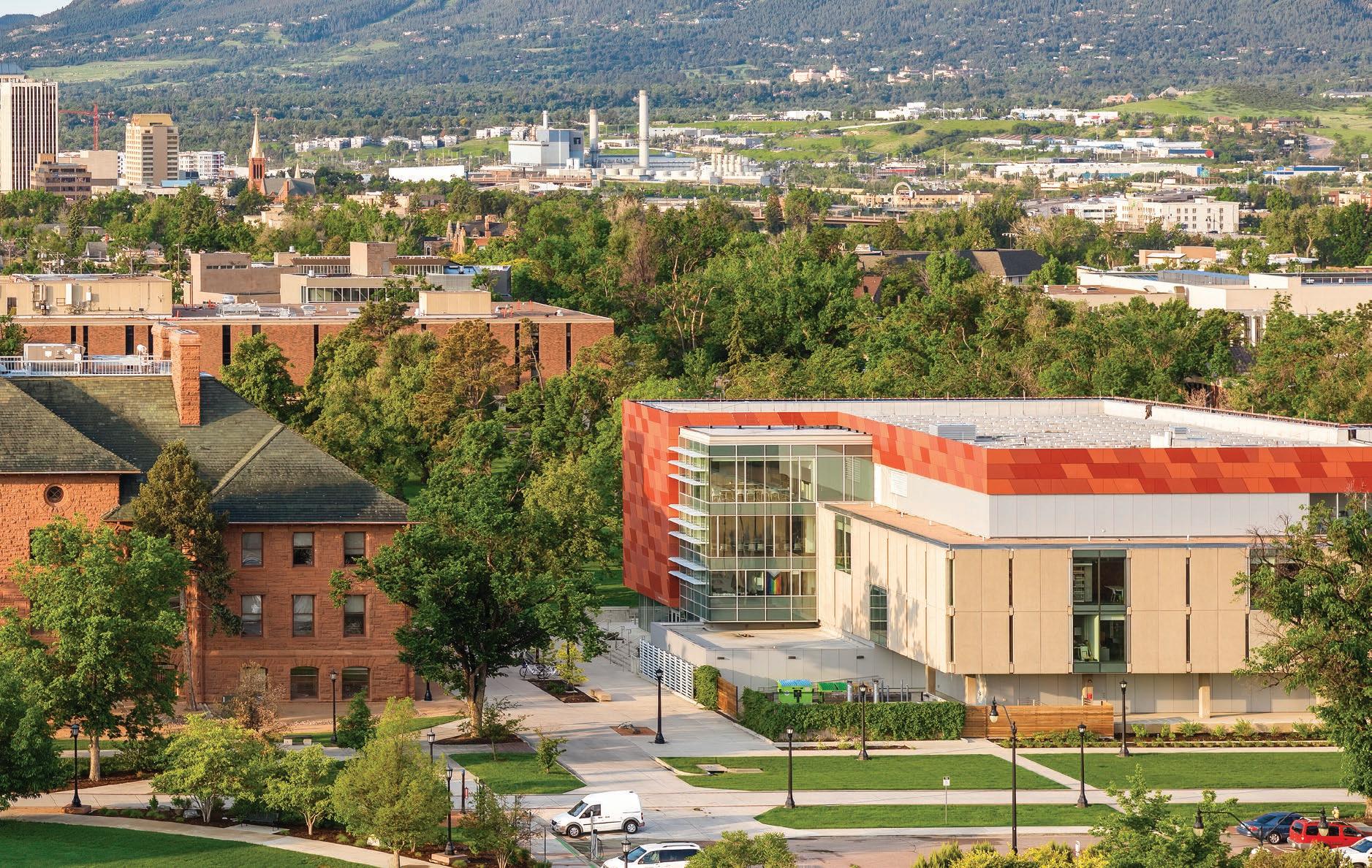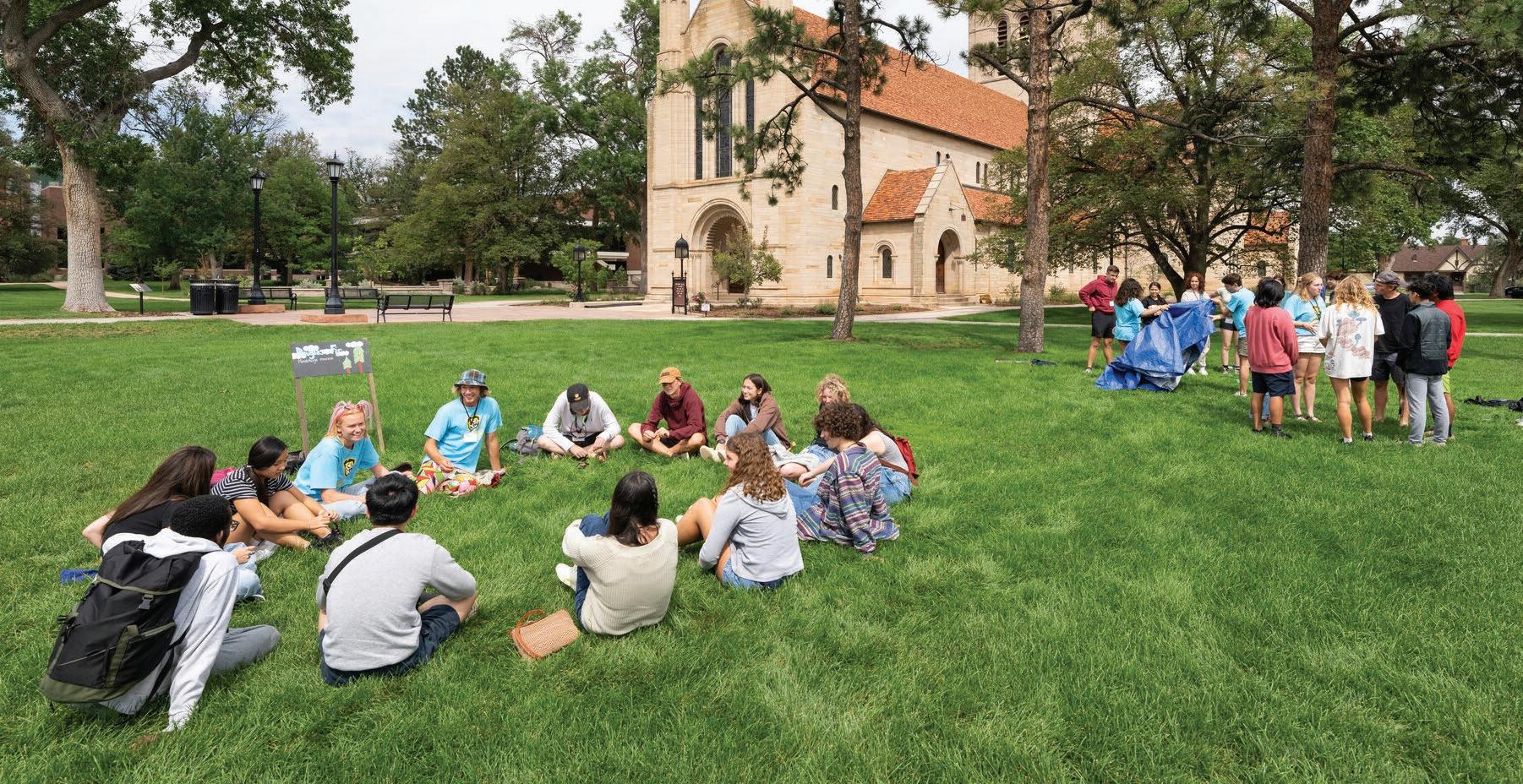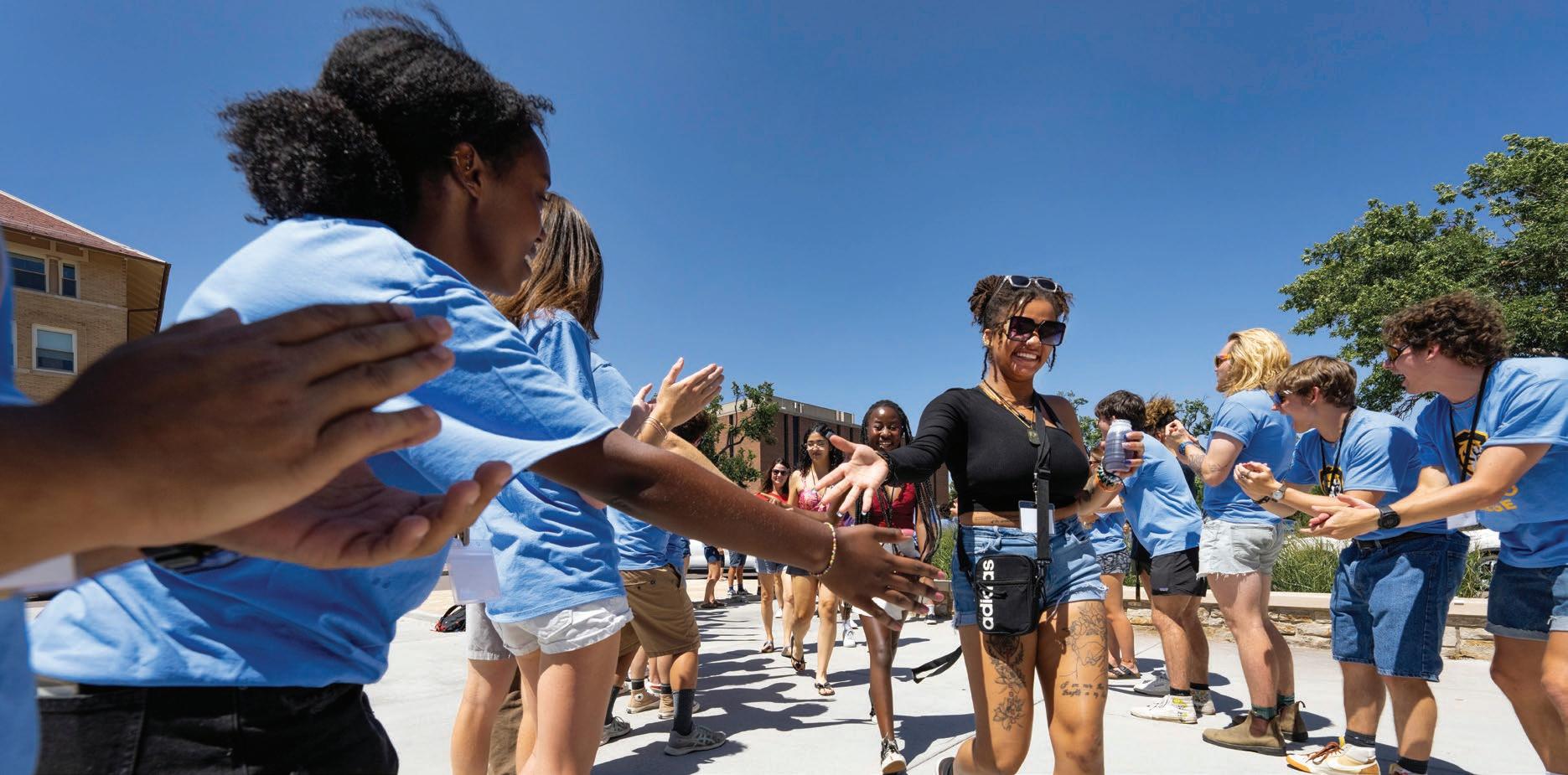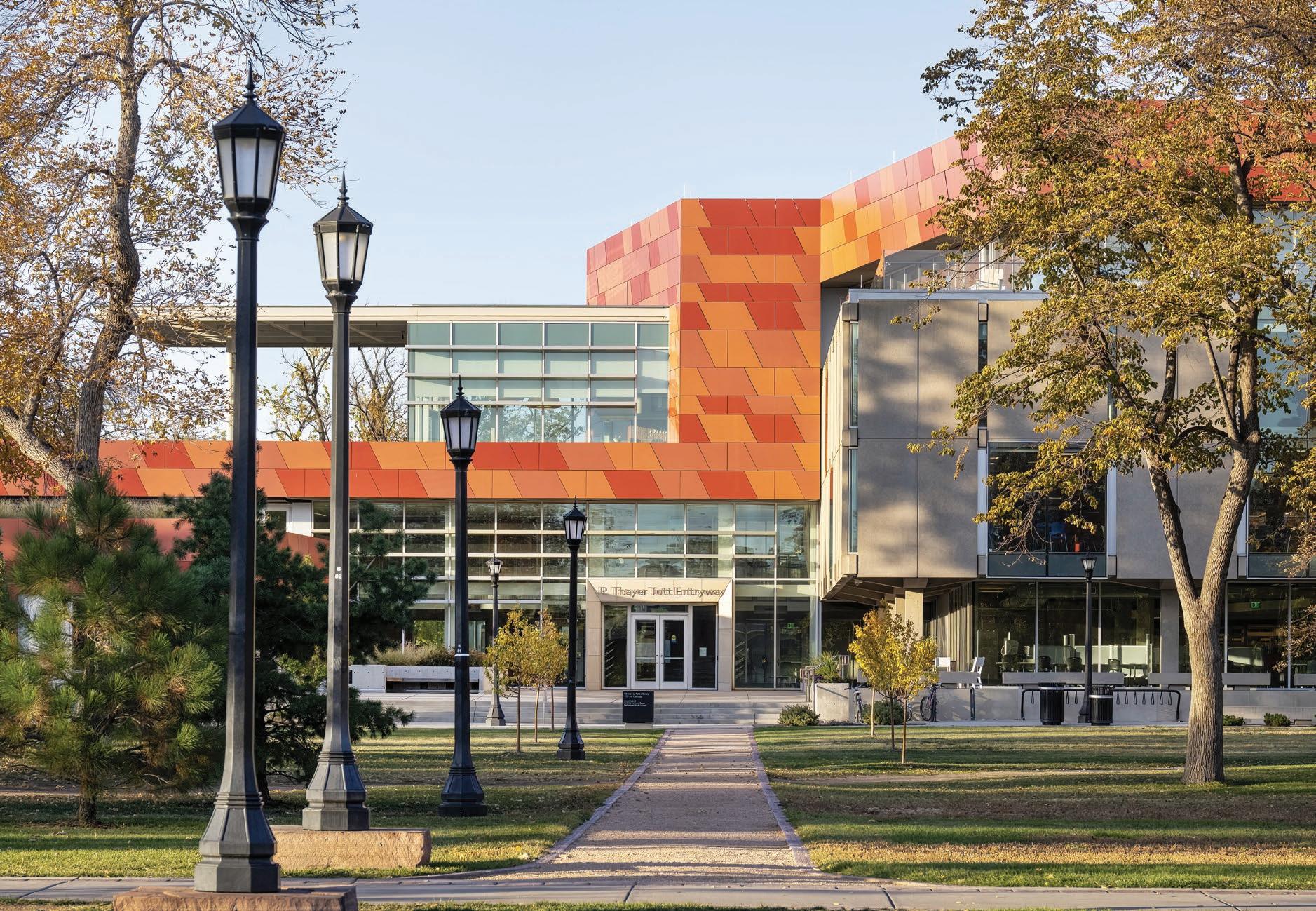














































































































































































































The ADEI team would like to thank the many people who have helped bring this strategic plan into being.
Thank you to the 2019 Antiracism Implementation Committee for their foresight and progressive vision to identify the need for addressing racism at Colorado College. Their work continues to inform our e orts today.
To the Antiracism Commitment Committee for their input, edits, and voices on the roughest of early drafts as well as their continued insight.
To Dr. Eric Denise Joy for their work on identifying initial metrics for this plan as well as the eleven divisional plans and extensive research on best practices which helped inform our final product.
To Dr. Jenifer deCoste for her strategic insight that allowed us to organize a complex system of priorities into easily digestible composite key performance indicators.
To Sam Heim for her extensive and invaluable proofreading and edits.
To Dr. Manya Whitaker for her unwavering support and challenge to push our team to actualize our potential and lead from a place of authenticity.
And to the many members of the CC community who have spent long hours with us sharing their experiences, their joy, and their pain and most especially their hopes for an antiracist CC.




































“In a racist society, it is not enough to be non-racist. We must be anti-racist.” —Angela Davis “
he Strategy for a More Just CC” is a living document that will evolve over time as members of the campus and external communities engage in and implement its work. This strategic plan builds upon the foundational AIP (2019) and includes three broad actionable themes – each containing ambitious goals, key performance indicators, and metrics for assessing progress. This plan is part of a larger institutional vision operationalized by the President, the President’s cabinet, and each individual community member.

The strategy in its current form was conceptualized using the National Association of Diversity O cers in Higher Education (NADOHE) Framework for Advancing Racial Equity and Antiracism Strategy on Campus. This framework addresses ten priority areas where antiracism strategies would significantly improve and prioritize conditions for Black, Indigenous, and People of Color (BIPOC) populations as well as the broader CC community. It focuses on institutional structure, policies and procedures, resource allocation, academic equity and student success, curriculum and pedagogy, hiring, retention and promotion, institutional programming, education/training, employee development, campus climate/ culture, and admissions and access.
The following outcomes will be realized through a successful implementation of the strategic plan goals:
• A stronger sense of belonging for all members of the CC community
• Improved success for all students
• Reduced intergroup disparities between marginalized and majoritized groups including, but not limited to, disparities in hiring, enrollment, retention, professional success, and graduation rates
• Increased ownership of antiracism, diversity, equity, and inclusion e orts by all students, sta , faculty, and members of the local community
• Improved cultural responsiveness and commitment to antiracism, diversity, equity, and inclusion among all members of the CC community
• Full engagement of students, sta , faculty, boards, and volunteers who support CC’s mission and vision





















































Institutional Equity & Belonging at Colorado College has a mission to model, inspire, and be active stewards of antiracism, diversity, equity, and inclusion (ADEI).
Our vision is a justice-centered CC in which all community members feel a sense of belonging and where we continuously uproot oppression wherever it exists, including within ourselves.
Our values include:
• Justice
• Lifelong learning, growth, and transformation
• Meeting people where they are
• Integrity
• Empowerment



• Honoring the whole person
• Authenticity
• Connection, collaboration, and coalition building
• Doing no harm
• Engaging with the head and the heart

“Antiracism is the commitment to fight racism wherever you find it, including within yourself. And it’s the only way forward.” —Ijeoma Ouleo
































































































In 2018, Colorado College commissioned Roger Worthington and his team from the Center for Diversity of Higher Education to conduct an external assessment of diversity, equity, and inclusion on campus. On May 17, 2019, Worthington and associates completed and submitted a report with recommendations for addressing challenges with individual, interpersonal, and organizational racism on and around campus. Using that report, a group of faculty, staff, and students developed and launched an Antiracism Implementation Plan (AIP) in 2019 – a time when few, if any, colleges or universities were focusing speci cally on dismantling racism. For ve years, that plan has guided signi cant progress on our commitment to antiracism. In the current moment, when many schools are defunding and delegitimizing DEI initiatives, CC is going deeper and working to take our commitment to new heights with a new strategic plan.

“Not everything that is faced can be changed, but nothing can be changed until it is faced.” —James Baldwin

As part of our ongoing commitment, a body of people operates diligently behind the scenes to o er perspective, review, guidance, and assessment of our institutional progress. This accountability panel, the Antiracism Commitment Committee (ACC), is critical to our institutional advancement. The ACC was formed in Fall 2020 and began regular convenings in Spring 2021. The committee is comprised of over 20 members, including students, sta , and faculty, who advance progress on the AIP and provide vital input on past and current ADEI strategic plans. The ACC will mobilize our new plan and monitor campus progress on its themes and goals. However, this approach does not detract from the collective e ort demanded by our institutional commitment to antiracism; it remains the responsibility of each and every one of us to address and dismantle systems that oppress wherever we find opportunities to a ect and be a part of the change.
While this work is hard and has no end, we commit to developing an antiracist practice that makes us better and prepares our students to push for a more just world. All of us must work diligently to be antiracist every day, in all that we do and all that we are. This requires every CC community member to shoulder the work of dismantling oppression, fostering belonging, creating equitable learning and working environments, and taking bold actions.
For these reasons, we embrace evolution that encourages adaptation to the unique needs of our community and have incorporated into the new plan a balanced approach to meet current challenges while embracing the dynamic strengths of our institution and its community.
After thoughtful assessment, acquired feedback, and deep collaboration, we believe that forward progress can be operationalized through three actionable themes:
With these at the forefront, we introduce CC’s ambitious new strategic antiracism 3-to-5-year plan, “The Strategy for a More Just CC.”










































External Review
• Institutional Recommendations 2018 2019
• Antiracism Implementation Plan
• Naming Ta’va Quad
Programming & Statements
• CC Drops out of US News & World Report Rankings
• Revised The Crown Center vision & mission, renamed
• Antiracism Community Engagement (ACE) Grant
• Stewardship Certificate Program
• TBC Peer Educators Program
Infrastructure, Capacity, Community
• New leadership structure within the President’s O ce
• Established Mission, Vision, Values for ADEI
• First divisional ADEI plans
• CC Admissions/HR Participates in Juneteenth
• Equitable Policy Review
Infrastructure



• Rochelle T. Dickey Multicultural Lounge Dedicated
• Instructional Coaching Program for Inclusive Pedagogy
• Policy Equity Analysis Tools
• HR Equity Baseline Assessment
• CC joins Refugee Alliance
• LGBTQ+ Basics workshop
• Fall Conference ADEI Theme
• New ADEI Strategic Plan
• Senior Associate Dean for Faculty Equity & Inclusion
• Senior Associate Dean for Students & ADEI
• Faculty Hiring Program
• $1M Antiracism Fund Gift
• LACRELA Membership (Racial Climate Surveys Begin)
Funding & Infrastructure
• ADEI Programs Coordinator
• O ce of Civil Rights & Title IX
• Mellon Humanities for All Time Grant
Capacity & Accountability
• Antiracism Commitment Committee Launched
• Butler Center Reorganized
• Annual ADEI Reports
• Learning Community for Equity & Power Courses
• Antiracist Book Club
• Mentoring Alliance Program for Faculty
• Assistant Vice President for Sta & ADEI
• Dismantling Hate Series
• Queer & Trans Collective
• Chasing Equity Sta Hiring series
• Institutional Equity & Belonging workshops
• ADEI Newsletter
• Intentional Interview Series
• HAVEN Initiative
• Antiracist Community of Action (ACA)




















































The previous page’s timeline is a snapshot of the ADEI work at CC since 2018. In the fall of 2021, the ACC set out to assess progress on the seven goals of the AIP. While not all of these ambitious goals were fully realized, we came away with a better understanding of the opportunities and gaps in our current efforts and of the AIP itself. This work was documented and the full report can be found here. Two racial climate surveys, one for students and one for staff, have fueled a better understanding of campus climate challenges for both sets of stakeholders. Additionally, a faculty survey was administered in Fall 2023 with results anticipated in June 2024.
Key areas of concern revealed by the fully-analyzed campus climate surveys:
Student Racial Climate Survey (Fall 2021):
1. Classroom climate and dynamics with White faculty were perceived as more negative than with faculty of color.
2. Experiencing and/or witnessing racism occurred at similar rates among White students and students of color. However, while these experiences increased White students’ commitment to justice, they decreased the well-being and classroom performance of students of color and increased their feelings of isolation.
3. Students feel unwelcome and unsafe in Colorado Springs.
Sta Racial Climate Survey (Spring 2022):
1. The majority of sta do not feel valued.
2. There are concerns regarding compositional diversity and retention of minoritized sta and faculty.
3. Sta perceive a lack of strategies that enhance talent acquisition practices.
4. Sta perceive a lack of transparency in the managing of incidents of institutional racism.
Based on these findings, several focus groups were convened to o er more qualitative and livedexperience accounts and to better inform strategic priorities and plan customization. The data gathered over the last five years has provided a clearer picture of what was achieved and what remains to be done. In addition to establishing new goals, we have also identified AIP goals that no longer align with the direction of CC’s antiracism and DEI e orts.
The ADEI strategic plan builds upon and evolves from the AIP of 2019. The result is an institutional plan with specific goals and defined metrics that support transparency in assessing progress and a pathway to quality goal attainment.
















































Designing Infrastructure (Policy, Procedures, Practices)




• Creating equitable organizational structures by identifying and dismantling barriers such as unfair or inconsistent policies, procedures, and practices that advantage some and disadvantage others
• Using assessment tools to create a constant feedback loop between data and the design of procedures, policy, processes, and curriculum
• Re-envisioning committees, teams, campus events, and projects so that ADEI strategies (welcoming diverse perspectives, asking tough questions [e.g. who is not represented in the room and why? who has access and who does not?], disrupting status quo, and welcoming innovation) are embedded and infused into all aspects of the college’s work
Goals:
1. Develop systems of accountability that offer exibility within parameters.
2. Codify and standardize policies, practices, and procedures.
3. Preserve and equitably distribute the college’s resources.
4. Develop iterative and action-oriented assessments of our organizational structures, policies, systems, and procedures to identify barriers and repair gaps for marginalized populations.
5. Develop academic and co-curricular experiences that foster intrinsic motivation, connect to learners’ cultural backgrounds, inspire a sense of purpose, enhance learner agency, support career aspirations, and enhance world readiness.

“There are no short cuts to any place worth going.” —Hellen Keller










































Cultivating Community (Connecting, Welcoming, and Belonging)
• Promoting a sense of belonging for all
• Increasing pro-social behaviors across campus
• Creating a campus culture and climate that fosters an institutional antiracist identity
• Having courageous conversations
• Caring for health and wellness
• Putting in extensive e ort to recruit, hire, and retain our sta , faculty, and students (e.g., mentorship, coaching, equitable search processes, and admission procedures, and taking serious bias incidents, discrimination, and harassment reporting and patterns (in consideration of all protected classes))
• Engaging in activities that encourage positive interpersonal interactions, such as team-building outings, explorations of personal and professional traits, and work style preferences
Goals:
1. Create and sustain a welcoming campus environment by increasing the compositional diversity of and sense of belonging for students, staff, and faculty, and cultivating diverse community partnerships.
2. Take bold actions to increase the visibility of our antiracism commitment.
3. Encourage the active participation of staff, faculty, and students with CC’s antiracism efforts.
4. Foster an inclusive de nition of campus educator.
5. Engage in initiatives to promote a deeper sense of place, community, history, and institutional identity in Colorado Springs and the Pikes Peak region, Colorado, and regions both adjacent to and beyond Colorado’s borders as we recognize that constituents sharing space in a unique liberal arts environment come from diverse geographic beginnings.
Building Capacity (Development, Education, Growth)
• Supporting (psychologically and monetarily) professional development, growth, and advancement of all community members
• Motivating all community members to engage with opportunities to strengthen their awareness (checking your privilege, recognizing power, understanding the influence of your position), knowledge, and skills
• Supporting risk-taking without negative repercussions
• Encouraging involvement in institutional programming, education, and training that adds value to the quality of work and student life; making an intentional e ort to embrace our vulnerability (permission to make mistakes/ask for help)
Goals:
1. Invest in strengthening knowledge and skills to encourage the use of assessments to inform revision and improvements.
2. Increase ADEI knowledge and skills for all positionalities, at all levels, and with all constituencies (faculty, staff, and students).
3. Enhance the use of inclusive, equitable, anti-oppressive teaching strategies so that both course content and course dynamics improve classroom climates.
4. Support and encourage engagement in ongoing learning opportunities.

“Every moment is an organizing opportunity, every person a potential activist, every minute a chance to change the world.” —Dolores Huerta


























There are four broad Key Performance Indicators (KPIs) in this plan:
• Belonging
• Equitable Student Success
• Institutional Justice
• Engagement
De ned KPIs are listed below alongside assessment metrics and examples of speci c strategies or tactics that could feed into that metric. Each college division, department, and/or unit may implement additional tactics that address more speci c and equally critical components of the KPIs and overall efforts to promote antiracism, diversity, equity, and inclusion.
The feeling of security and support when there is acceptance, inclusion, and identity for a member of a certain group. It is when an individual can bring their authentic self to work/school/play and know that they are expected, planned for, accepted, and missed when absent.
• Sense of belonging
• Measured using specific questions on climate surveys such as ModernThink, LACRELA, or other identified standardized instruments which indicate how we are seen, connected, supported, and take pride in our a liation.
• Rethink/revamp key campus events which can intentionally bring constituents together to build community (Fall/Spring Conference, Award Ceremonies, First Mondays, CampusFest, CCFest, etc.).
• Increase alumni engagement from marginalized groups.
• Retention
• Improve the retention of faculty, sta , and students.
• Develop and implement a routine strategy for exit/withdraw/leave of absence review and analysis for all constituencies.
• Sense of place
• Establish new partnerships with Colorado Springs area organizations that serve marginalized and minoritized communities (such as Divine Nine fraternities and sororities, chambers of commerce, etc.).
• Cultivate (tend to) relationships with area Tribal nations including the Ute Mountain Tribe, Arapaho, Comanche, and Cheyenne.
• Develop and articulate an understanding of the Mexican and Indigenous origins and lasting presence in the region.
• Develop an orientation module for new community members that provides an understanding of the complex history of the region and CC’s role in it.

“We may not have been around when its concrete foundations were poured, but we exist in the structures those foundations support.”
—Shereen Daniels

Measures of student engagement which produce positive outcomes, a fulfilling experience and progression towards graduation and beyond without disparity.
• Student Support
• Develop a process for e ectively and equitably responding and intervening when students are struggling or at-risk academically, mentally, and/or physically.
• Assess the quality and equitable utilization of academic support services.
• Academic Experience
• Conduct an equity audit of academic policies.
• Assess student experiences of inclusion in high impact practices.
• Create a course evaluation item to assess classroom climate.
• Develop a co-curricular structure to support educational continuity and career competencies for all students.
• Assess the impact of the Equity & Power general education course requirement on student ADEI learning every three years.
• Graduation Rate
• Increase the graduation rate of marginalized/minoritized students to reach 90% within 5 years, with special attention to demographic-specific gaps of more than 5%.
• Develop and implement a diversity, equity, inclusion, and belonging student success plan that addresses retention, graduation, and outcomes, disaggregated by various demographics and their intersections (race, class, gender, first-generation status, etc.).
Organizational methods can serve as catalysts of equity and the operationalization of policies, procedures, and practices. Institutional justice is defined by how equitable our distribution, procedural, interpersonal, informational, and disparity reduction channels are when applied to real world situations.
• Hiring
• Develop and implement a plan to ensure that every open position is advertised in targeted publications and professional organizations.
• Develop training on equitable hiring practices and have all search committee members successfully complete training.
• Develop a career advancement system that defines pathways to promotability and/or equivalent career trajectory alternatives.
• Conduct annual audits of hiring practices to identify opportunities for improvement and monitor the explicit consideration of expertise in inclusive, equitable, anti-oppressive, and/or student-centered teaching practices.
• Access
• Participate in the Aspen Institute program to increase enrollment of Pell-eligible students.
• Make ADEI-related data commonly available and utilized by all employees as appropriate for operational decision-making.
• Address underrepresentation across all groups that conflict with evidence-based findings and national trends.
• Identify areas of opportunity to increase financial aid supporting the institutional ADEI commitment.
• College Resources
• Conduct routine assessments to evaluate current partnerships and determine areas of opportunity to increase distribution and reallocate resources equitably.
• Move toward a resource allocation approach that is a blend of zero-based and incremental budgeting to ensure resource distribution for all college o ces is equitable and remains current.
• Expand revenue-generating opportunities that are aligned with institutional values and strengths.
• Systems and Operations
• Develop and use a common tool for identifying bias and promoting equity in policies and procedures.
• Establish a recurring system of equity assessments for all campus policies and procedures when federal or state regulations prompt institutional policy change and when critical incidents warrant policy update/evaluation.
• Develop a comprehensive and e cient accommodation system that evaluates and identifies improvement strategies advancing systematic procedures that adhere to ADA compliance and advancing anti-oppressive practices.
• Develop an equitable pay system (pay equity audits, band reconfigurations, and consistent application of compensation procedures) centering the margins and using evidence-based practices.
• Establish an inclusive and equitable operational governance model that supports change and e ciency.
• Assessment
• O er and utilize campus climate surveys for students, sta , and faculty on a regular basis.


“Institutional neglect of racism and injustice is the exercise of power, the kind of power that refuses to notice and refuses to speak.” —Je Chang






This metric centers and prioritizes opportunities to build capacity through education, training, and other development activities that advance knowledge, skills, and abilities to support the college’s institutional commitment and individual growth.
• Training
• O er ADEI professional development, workshops and education opportunities for students, faculty, and sta .
• Incentivize continued ADEI learning through recognition (Stewardship Certificate), funding opportunities (ACE Grants, etc.) and/or experiences.
• Implement a sustainability plan to support the peer educator program to ensure that student leaders continue to advance antiracist policies in their clubs and governance.
• Strategy
• Every division will have its own annual ADEI action plan.
• Strategically advance ADEI principles in internal and external communications, messaging, and institutional response.
• Identify and apply for grants, awards, and recognitions to elevate CC’s national and international profile around ADEI each year.
• Participation
• Sta and faculty awareness, attendance, and key event-specific outcomes will all increase appropriately each semester as measured in the Stewardship Certificate Program.
• Implement solutions to remove barriers to the engagement of socially and economically disadvantaged alumni and the broader Colorado Springs community.

“Our strength lies in our unity, and our unity lies in our respect for one another.” —Chief Ouray






































































he Strategy for a More Just CC” will guide us for the next 3-5 years as we work to deepen our commitment to antiracism, diversity, equity, and inclusion. We hope this plan inspires continued ADEI engagement and efforts that foster and empower current and future leaders in this work who ght to disrupt and dismantle systems of oppression wherever they are found. We have accomplished much in the last ve years, laying a strong foundation from which to continually elevate our ADEI work. While this work has been, is, and will continue to be challenging, its importance is underscored by systemic change that leads to an equitable educational environment and inspires students, staff, and faculty to take action and ownership over our collective commitment to build a more just society for all.

www.coloradocollege.edu/offices/adei